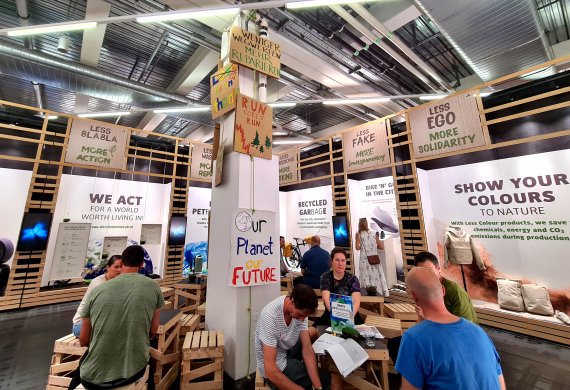
This question has asked Nordisk CEO Erik Møller and his team. The answer: the Asgard Eco concept tent. A tent that would completely disappear after four to six weeks underground. That's because everything about the tent is compostable. The windows are made of jute, the guy ropes are made of sisal and coconut fiber, the pegs are made of bamboo (which, by the way, are sturdier and easier to make than the aluminum variety), and seashells were used for the buttons. The cotton material is coated with beeswax and thus water-repellent. The tent is not yet available for purchase, but Møller is curious to see how it will be received by trade visitors at OutDoor by ISPO. If demand is high, the tent could well go into production. The consumer would not have to dig much deeper into his pocket than for "ordinary" tents. According to Møller, it should cost around the 1800 euros.
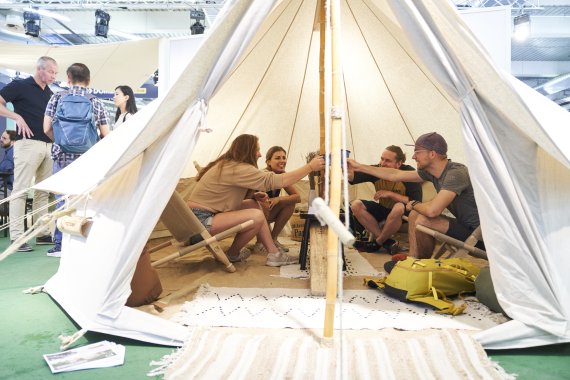
Manufacturer VAUDE has been a pioneer for climate neutrality and sustainability in the outdoor industry for over a decade. Despite a global supply chain and 50 suppliers, Vaude creates 2022 together with myclimate to become climate neutral on a global level. In the process, 88 percent of the entire collection is Green Shape certified, and in the outdoor segment even the full range. The company's own production near Lake Constance has already been climate-neutral since 2012. The outdoor manufacturer pursues a holistic approach: from the design of the product, to the selection of materials and environmental aspects during production, to care and repair. So at the beginning, the question is "Do we really need the product?", says Benedikt Tröster from Vaude. Because the idea is moving more and more toward multi-use. "Wear less, achieve more," is the motto at Vaude. But not only the manufacturers, also the end customer should ask themselves the question, according to Trösters: Do I really need this new jacket? Can I not put on my jacket when hiking and biking?
Manufacturers agree on one topic: sustainability does not always just mean that the product must consist of 100 percent recycled raw materials or be completely compostable. Durable products that, in the best case, last a lifetime and can be repaired are just as much a part of a sustainable strategy and future. Small manufacturers are also of this conviction: WeeDo make fun and sustainable outdoor "fun" wear for kids. They try to be sustainable beyond the finished product: WeeDo offers a repair service as well as a "second life" service. Old products are exchanged for a voucher and then resold.
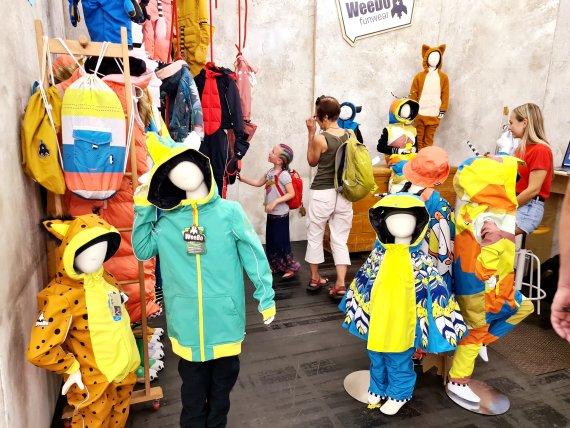
For 160 years, EDELRID, manufacturer of safety equipment, is located in the Allgäu region and specializes, among other things, in dynamic ropes for climbing and alpine tours. EDELRID encounters special challenges when it comes to sustainability: The manufacturer's products are PPE (personal protective equipment) products on which the user's life depends. The products, as well as the materials used in them (including polyamide 6.6), are subject to strict standards. Until now, it was not possible to manufacture PPE products from recycled materials, as the material loses quality after each processing cycle. But EDELRID has succeeded in producing the Neo 3R rope from recycled rope scraps. Several million meters of rope remnants are generated every year during the production of 3R ropes. These rope remnants are now shredded, granulated and re-spun in a specially developed process, so that yarn is made from 100 percent recycled material.
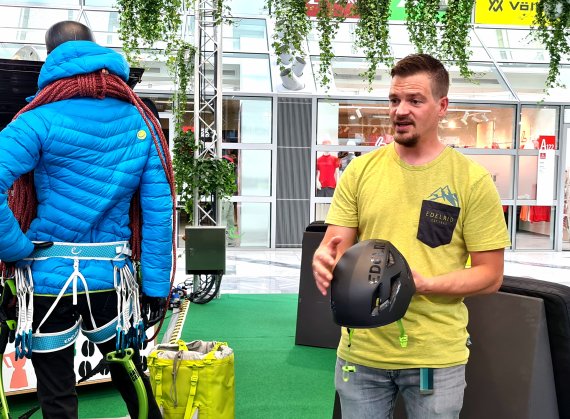
The ropes that are currently sold are "only" made of 50 per cent recycled yarn, says Felix Schäfer, sales manager at EDELRID. The problem is that a rope made of 100 per cent virgin material is cheaper than the sustainable rope produced from waste products. According to Fritz Schäfer, the sales manager, end consumers would probably not accept the high price. However, demand for the Neo 3R rope is high: half of the orders had to be cancelled. The second sustainable safety product from EDELRID is the Zodiac 3R helmet. The polyamide of the rope remnants is melted down and used for the plastic of the outer shell, inner shell made of recycled polyester.
The visitors of the OutDoor by ISPO get a lot more information about sustainability in the Sustainability Hub. There GreenroomVoice shows how large companies and suppliers such as Icebug, Globetrotter or American Wool implement sustainability. A look behind the scenes, so to speak. The Hub will focus on three main areas in particular: Traceability, transparency and what impact the climate protection measures of manufacturers have.
In the ISPO Award Exhibition Area, the most innovative outdoor products of the future are on display. Here it can be seen: sustainability is and remains a dominant trend. Three products stand out in terms of sustainability. First up: the Terra Scout headlamp from Silva. The Swedish manufacturer shows that sustainability is also possible in hardware. The plastics and illuminants used are made from recycled materials. In addition, Silva does not dye the material, which often creates chemical waste products.
End-of-life, that is, what happens to a garment at the end of its use, will play an increasingly important role. The New Zealand manufacturer Kathmandu relies on this with the NXT Level Bio Down Jacket. The materials are of natural origin and thus the complete jacket is biodegradable.
How circular economy can work, shows sporting goods manufacturer Schöffel with its CIRC Pants LOOOP pants. The recyclable polyester from which the pants consist of 100 percent can be converted back into polyester at the end thanks to a highly efficient recycling process.
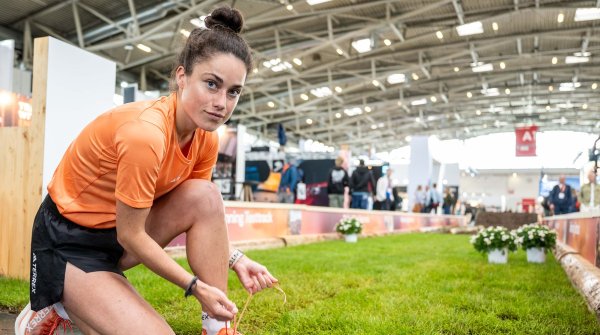 OutDoor by ISPOShaping the (outdoor) future together
OutDoor by ISPOShaping the (outdoor) future together OutDoor by ISPOHighlights of OutDoor 2024 in pictures
OutDoor by ISPOHighlights of OutDoor 2024 in pictures
- ISPO awards
- Mountain sports
- Bike
- Design
- Retail
- Fitness
- Health
- ISPO Job Market
- ISPO Munich
- ISPO Shanghai
- Running
- Brands
- Sustainability
- Olympia
- OutDoor
- Promotion
- Sports Business
- ISPO Textrends
- Triathlon
- Water sports
- Winter sports
- eSports
- SportsTech
- OutDoor by ISPO
- Heroes
- Transformation
- Sport Fashion
- Urban Culture
- Challenges of a CEO
- Trade fairs
- Sports
- Find the Balance
- Product reviews
- Newsletter Exclusive Area
- Magazine
